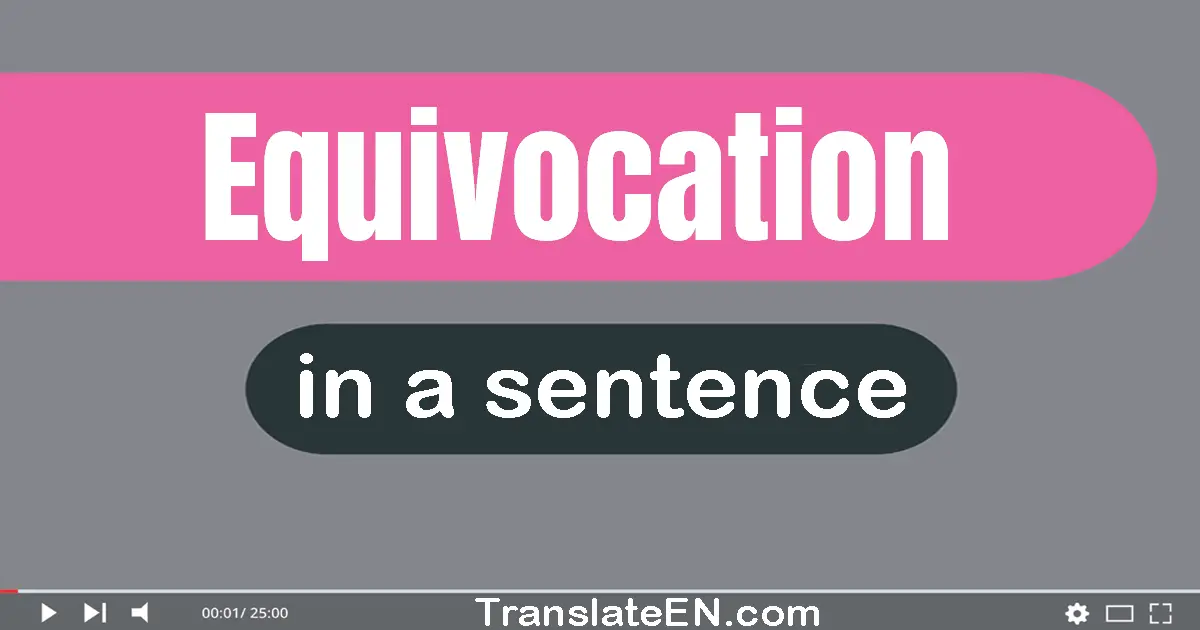Equivocation in a sentence
Synonym: ambiguity, deceit. Antonym: clarity
Meaning: The use of ambiguous language to mislead or avoid a direct answer; often seen in arguments.

(1) The argument relies on the logical fallacy of equivocation.
(2) The witness's equivocation led to the case being dismissed.
(3) His equivocation during the job interview cost him the offer.
(4) The politician's equivocation on the issue caused public outcry.
(5) The equivocation mislead the listener away from the clear meaning.
(6) The CEO was criticized for equivocation during a press conference.
(7) The equivocation mislead the listener near the ambiguous statement.
(8) The manager used equivocation when delivering bad news to the team.
(9) The defendant's equivocation only served to incriminate him further.
(10) The salesperson's equivocation made the potential customer suspicious.
Equivocation sentence
(11) The student's equivocation on the topic showed a lack of comprehension.
(12) The teacher warned the students not to use equivocation in their essays.
(13) Equivocation can be a form of manipulation in interpersonal relationships.
(14) The tergiversator's constant equivocation made it impossible to trust them.
(15) The singer's equivocation during the performance disappointed the audience.
(16) Equivocation is often used by those who are attempting to avoid responsibility.
(17) She accused him of equivocation when he refused to answer her question directly.
(18) Her equivocation frustrated her coworkers who were looking for a clear decision.
(19) Equivocation can be unintentional, but it can still lead to negative consequences.
(20) The athlete's equivocation on her performance was a sign of her lack of confidence.
Equivocation make sentence
(21) The company's equivocation regarding their product's safety caused a public scandal.
(22) The employee's equivocation when asked about the missing documents raised suspicion.
(23) The pastor's equivocation during the sermon caused confusion among the congregation.
(24) The detective suspected equivocation when the suspect's story changed multiple times.
(25) The defendant's equivocation on the witness stand was not well received by the judge.
(26) The lawyer relied on equivocation to create reasonable doubt in the minds of the jury.
(27) The lawyer's equivocation on the witness's credibility only served to weaken their case.
(28) The speaker's equivocation made it difficult for the audience to understand his message.
(29) The politician's speech was full of equivocation and avoided providing any clear answers.
(30) The company's equivocation on the safety of their products led to a loss of consumer trust.
Sentence of equivocation
(31) The teacher's equivocation on the grading policy left many students confused and frustrated.
(32) The therapist noticed the patient's equivocation, as he struggled to express his true feelings.
(33) Despite his equivocation, it was clear that he had no intention of following through on his promise.
(34) The therapist recognized the patient's equivocation, as he avoided discussing the root of his problems.
(35) The judge was unimpressed with the defendant's equivocation, as he refused to admit guilt or innocence.
(36) The CEO's equivocation on the company's financial situation only fueled rumors of impending bankruptcy.
(37) The CEO was criticized for his equivocation, as he failed to take responsibility for the company's mistakes.
(38) The teacher was frustrated with the student's equivocation, as he refused to take a clear stance on the topic.
(39) The detective suspected the suspect's equivocation, as he gave conflicting statements about his whereabouts on the night of the crime.
Equivocation meaning
Equivocation is a word that refers to the act of using ambiguous language or expressions in order to avoid making a clear and direct statement. This can be a useful tool in certain situations, such as when trying to avoid offending someone or when trying to maintain a sense of neutrality. However, it can also be a frustrating and confusing tactic when used excessively or inappropriately. If you are looking to use the word equivocation in a sentence, there are a few tips that can help you to do so effectively. First and foremost, it is important to understand the meaning of the word and how it is typically used in context. This will help you to choose the right words and phrasing to convey your intended meaning. One way to use equivocation in a sentence is to describe a situation in which someone is deliberately avoiding giving a clear answer or taking a clear stance on an issue.
For example, you might say, "The politician's equivocation on the issue of climate change left many voters feeling frustrated and uncertain about where they stood." Another way to use equivocation in a sentence is to describe a situation in which someone is using ambiguous language in order to avoid taking responsibility for their actions or decisions.
For example, you might say, "The CEO's equivocation about the company's financial situation raised suspicions among investors and led to a drop in stock prices." When using the word equivocation in a sentence, it is important to be clear and concise in your phrasing. Avoid using overly complex language or convoluted sentence structures, as this can make your meaning unclear and difficult to understand. Instead, focus on using simple, straightforward language that clearly conveys your intended meaning.
Overall, using the word equivocation in a sentence can be a powerful way to describe a situation in which someone is being intentionally vague or ambiguous. By following these tips and using the word in the right context, you can effectively convey your message and make your writing more engaging and impactful.
The word usage examples above have been gathered from various sources to reflect current and historical usage of the word Equivocation. They do not represent the opinions of TranslateEN.com.
